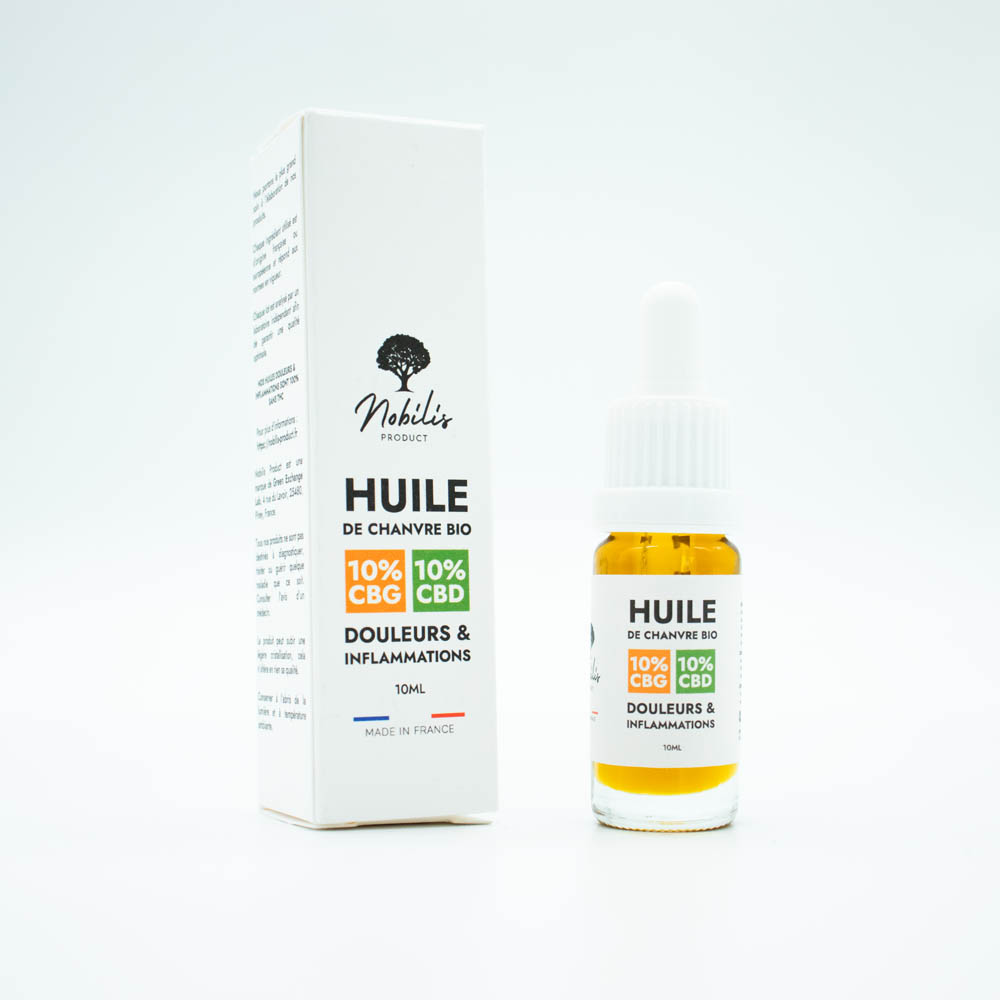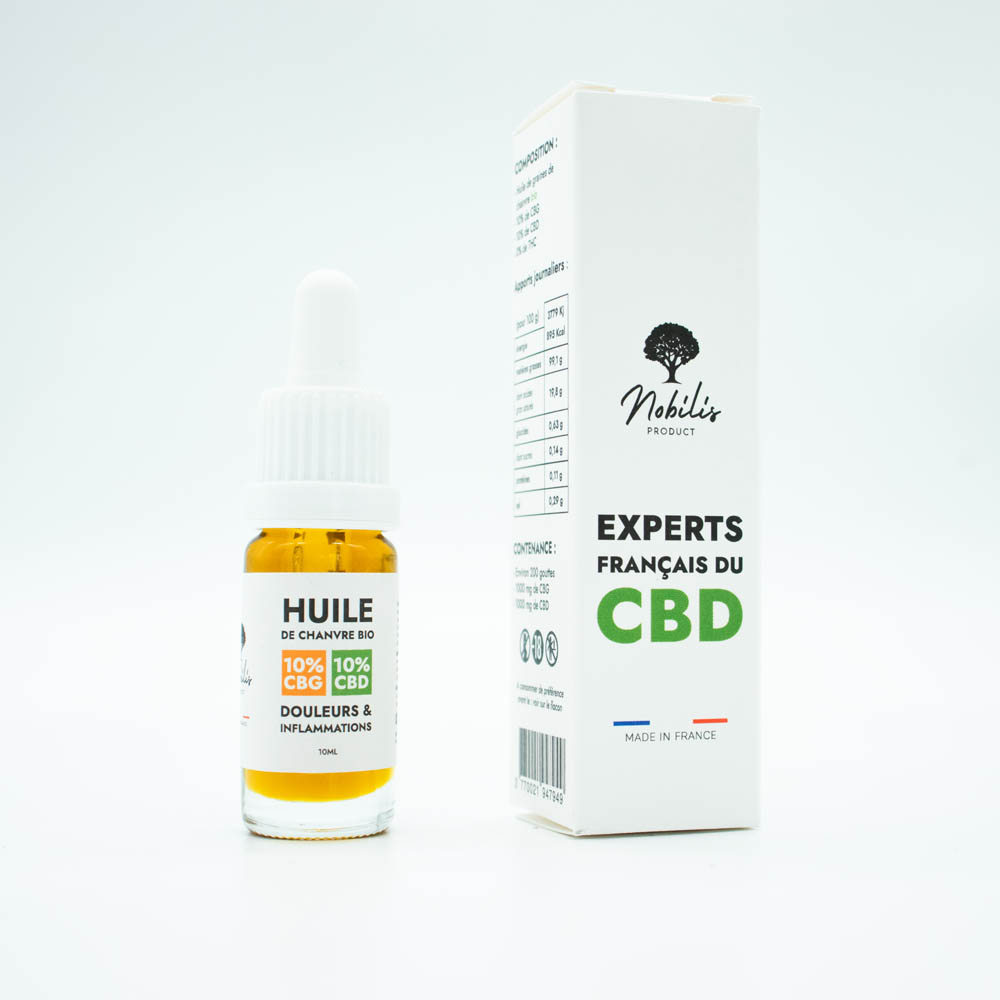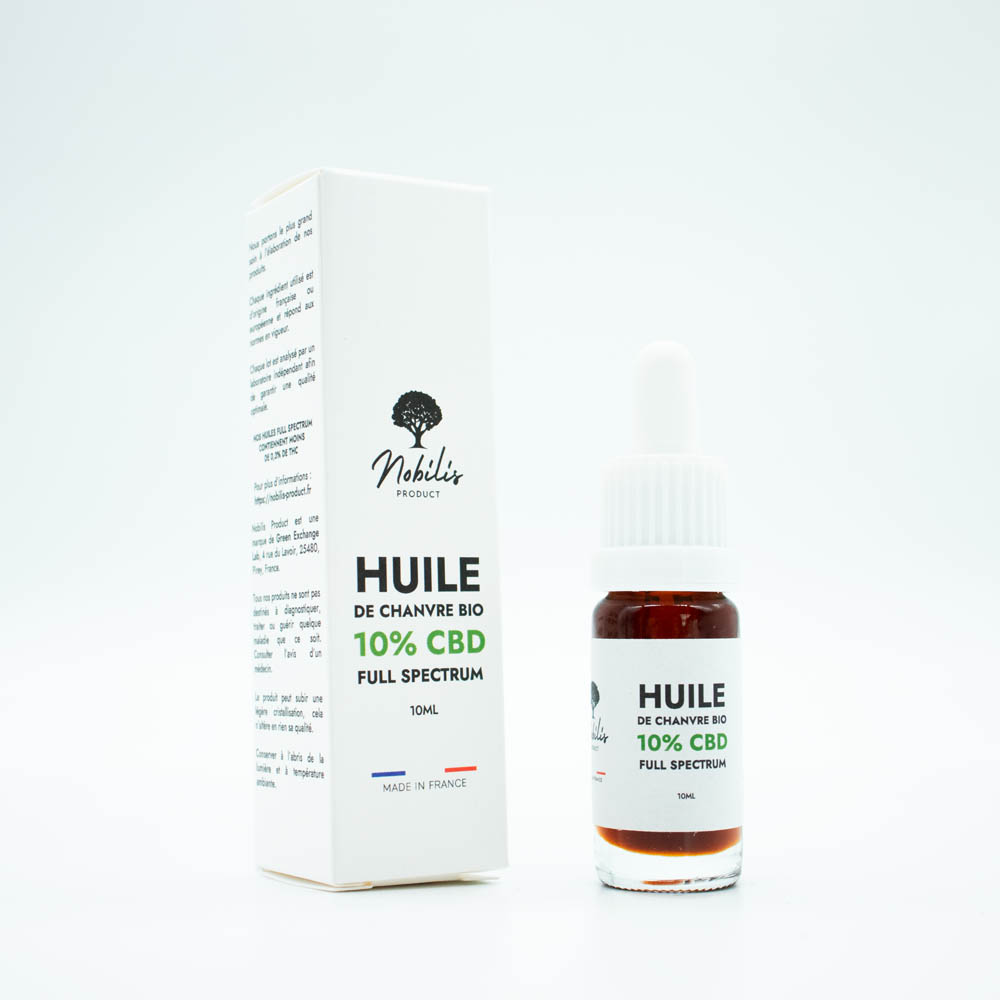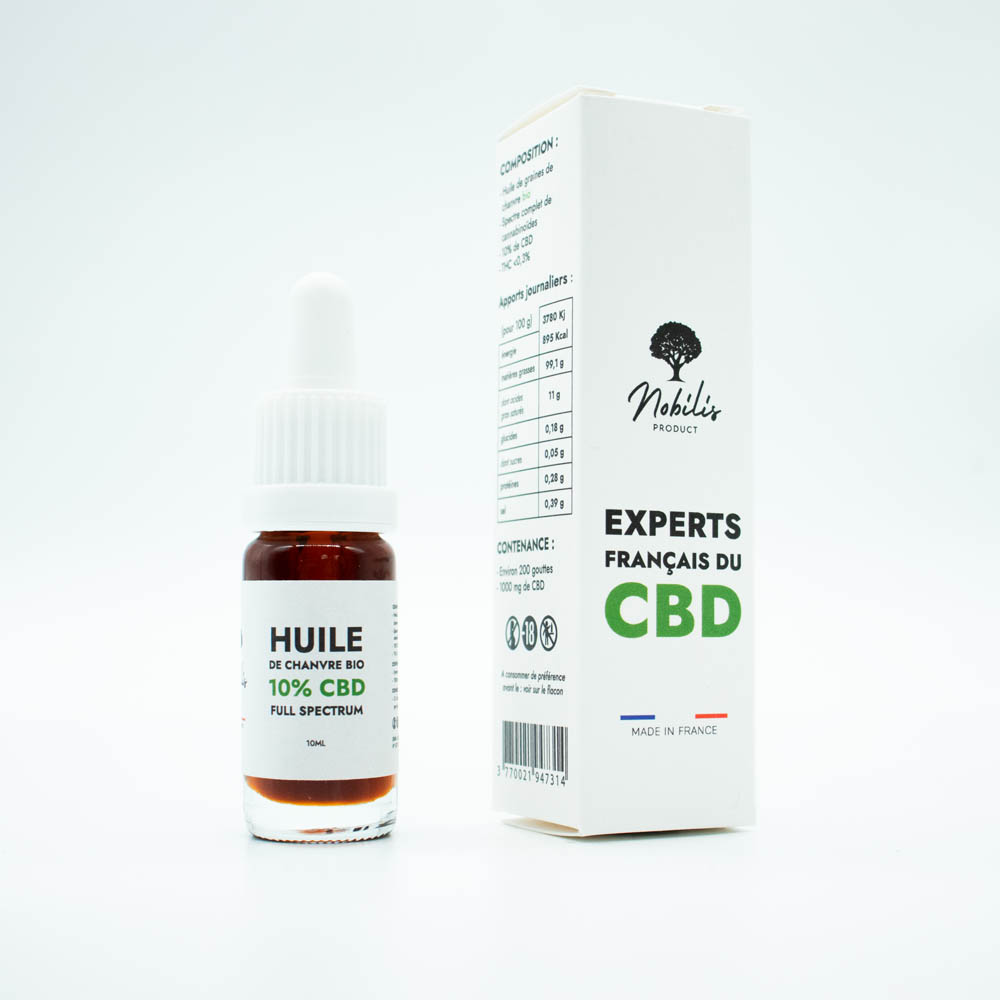The menopause is an obligatory passage that many women dread, and with good reason. Indeed, beyond the psychological impact of the end of the fertile period (and the beginning of "old age"), some experience very unpleasant symptoms, which can even significantly reduce their well-being.
While some hormone treatments can help reduce these symptoms, many women prefer to turn to natural solutions like cannabidiol (CBD). Let's take a look at how this small molecule derived from hemp can help women going through menopause.
Table of contents
Menopause: causes, symptoms and treatments
Everyone more or less knows what the menopause is: the end of menstruation. However, very few people know just how complicated "coming of age" can be. Let's take a quick look before focusing on the possible benefits of CBD.
Menopause: when, how, why?
Menopause, also known as "climacteric age", is an unavoidable biological phenomenon that generally occurs between the ages of 45 and 55, when menstruation stops.
More precisely, menopause occurs when the ovaries stop working. That is, they produce neither the female sex hormones progesterone and estrogen, nor the egg normally released by the follicle each month.
Unlike the first menstrual period, which arrives suddenly, menopause sets in gradually. A distinction is made between :
- Premenopause, characterized by irregular menstrual cycles and possibly hot flushes.
- This period can last from 2 to 4 years;
- The menopause, marked by the last ovulation and therefore the last menstrual period;
- Perimenopause, which begins with the first symptoms and ends one year after the last menstrual period;
- And finally, post-menopause, which begins one year after the last menstrual period and lasts until the end of life.
Menopausal symptoms appear during the perimenopausal phase. In other words, a few years before menopause and one year after. The length of this period varies from woman to woman. As does the intensity of the symptoms caused by the hormonal drop.

Common symptoms
In addition to menstrual cycles and fertility, sex hormones, in particular estrogens (estradiol, estrone and estriol), control many aspects of our health. They influence brain chemistry (mood management), bone consolidation, the digestive system, metabolism, and the quality of skin and hair.
As a result, when estrogen and progesterone levels fall, apart from the cessation of menstruation, a multitude of symptoms may appear:
- Bloating, swollen belly ;
- Sleep disorders, insomnia ;
- Stress, anxiety, depression, mood swings;
- Chronic fatigue ;
- Joint pain ;
- Loss of muscle and increase in body fat;
- Diabetes ;
- Hot flashes, night sweats ;
- Vulvovaginal dryness;
- Urinary problems (leaks, infections, etc.);
- Headaches, migraines ;
- Decreased libido.
Menopause also increases the risk of osteoporosis and cardiovascular disease.
What about treatments?
While some women go through menopause without any particular discomfort, others are forced to look for a solution. Possible treatments include :
- Hormone therapy, to make up for hormonal deficiency. But this treatment is generally recommended in cases of early menopause or when symptoms are really disabling;
- Antidepressants. Over 60% of menopausal women suffer from anxiety and depression;
- And finally, Gabapentin or Clonidine, for hot flushes.
However, most of these treatments have unpleasant side effects, when they are effective... As a result, many women opt for a natural option such as Bach flowers, essential oils, the practice of yoga, meditation, or follow a therapy.
And in recent years, a new natural alternative for treating menopausal symptoms has emerged: cannabidiol (CBD).
Menopause and CBD: what does the science say?
As a reminder, cannabidiol (CBD) is a non-psychotropic, legal molecule derived from hemp that acts on numerous target receptors scattered throughout the body.
Although the molecule is not yet fully understood, it is already credited with numerous properties, including anti-inflammatory and anxiolytic properties.

CBD and menopause
In the specific context of CBD use during menopause, very little research is being done. However, a study published in Frontiers Pharmacologydid show a link between CBD and estrogen production estrogen in mice [2].
It would appear that cannabidiol can stimulate the production of this sex hormoneand, consequently, curb some of the symptoms caused by reduced production.
This discovery could eventually lead to a treatment for menopause. But before that can happen, many more studies are needed.
Cannabis therapy and menopause
While the action of cannabidiol on menopausal symptoms is largely undocumented, that of medical cannabis is a little better documented. Just to clarify, medical cannabis contains CBD, but not only CBD! It contains a multitude of other cannabinoids, including THC.
In the United States, medical cannabis is authorized in several states. As a result, many women use it on a daily basis to treat their symptoms. And according to some studies, it's quite effective!
A study conducted on 131 participants revealed that taking medical cannabis helps to reduce the incidence of certain symptoms such as sleep disorders, hot flushes, depression and anxiety [3].
Although this study was conducted on a small scale and does not constitute the efficacy of cannabis, observations made by a committee of scientists also point in this direction. Indeed, after examining over 500 studies on the link between medical cannabis and menopause, the research team concluded that the plant could indeed be effective against the aforementioned symptoms[4].
In France, the use of medical cannabis is unfortunately not authorized. There are, however, legal products capable of offering a similar action. We'll come back to this at the end of the article.
What symptoms can be treated with CBD?
As we mentioned earlier, CBD acts on certain receptors in our bodies, giving it certain therapeutic properties. It could therefore have a beneficial effect on many menopausal symptoms.
Mood disorders: stress, anxiety and depression
CBD-based products are appreciated by people prone to depression, stress and anxiety, as they are an effective potential aid for relaxation.
In fact, cannabidiol acts on our brain chemistry on two levels:
- On the limbic system (hippocampus, amygdala and hypothalamus), which is involved in mood management via the synthesis of serotonin and dopamine. Preliminary studies suggest that CBD may increase blood flow to this area of the brain, helping to regulate its function [5] ;
- and then on GABA neurotransmitters, which reduce blood pressure and heart rate after a stressful event. Studies have shown that CBD induces a state of relaxation thanks to its affinity with GABA receptors.
Psychological symptoms are those that most affect women going through menopause. Taking CBD could therefore be a valuable aid, although in the case of severe depression or chronic anxiety, you should not hesitate to consult a professional.
Chronic pain
About 60% of women over 40 suffer from joint pain such as arthritis. And this is no coincidence! [6] In fact, the lower the estrogen levels the more the body produces anti-inflammatory molecules. This could explain why climacteric age is generally accompanied by increased physical sensitivity and previously silent pain.
If this is the case for you, taking CBD may help. In fact, some studies show that cannabinoids have an immunosuppressive effect [7], which means they can reduce inflammation. Although their mechanism of action is poorly understood, it can be likened to the action of treatments administered to people with polyarthritis.
Loss of bone density / osteoporosis
Falling estrogen production also affects bone remodellingincreasing both the risk of fracture and the risk of developing bone disease. In concrete terms, 1 in 3 women over 50 suffer fromosteoporosis.
In addition to the usual recommendations (practicing sports, eating foods rich in calcium, phosphorus and vitamin D), taking products formulated with CBD could help preserve bone health.
According to some studies [8] conducted on mice, CBD has a certain affinity with receptors located in our bone tissue. in our bone tissue whose role is to regulate bone remodelling. It has demonstrated that taking CBD intake significantly increases bone consolidation [9]. However, it remains to be seen whether such observations can be transposed to the human model.
General health benefits
Throughout this article, we've talked about CBD's affinity for receptors located throughout our bodies. What we haven't said (and this is important!) is that these receptors are part of a complex network called the endocannabinoid system. And their role is to maintain our body in a state of homeostasis, i.e., in good health.
To achieve this, cannabinoids act as regulators. They correct any imbalances in certain physiological processes, such as body temperature, the synthesis of certain hormones (including serotonin, the "happy hormone"), blood sugar levels, and so on.
As a result, taking CBD can have a more global effect and help menopausal women on different levels:
- For reduce hot flashesby regulating internal temperature;
- But also to improve sleep quality and regain energy, thanks to its tranquilizing action;
Finally, taking CBD could also help to a more fulfilled sexualityonce again, thanks to its tranquilizing and anxiolytic action.
How to use CBD oil for menopause?
If you're interested in testing the effects of CBD on your symptoms, then you're probably a little lost in the midst of so many products ! In fact, the most important thing is to choose a product that fits your lifestyle, tastes and habits.
CBD flowers are a great option, but if you don't want to smoke or vape, and are looking for a discreet solution, then CBD oil is probably the best choice.. But don't just take any oil! Here's our advice.
Which CBD oil to choose?
There are many brands and types of CBD oil. As far as the brand is concerned, choosing Nobilis-Product gives you peace of mind, because our products are 100% French, 100% organic and above all, they are delivered with laboratory analysis results guaranteeing their composition.
As for the type of oil, there are three: full-spectrum, broad spectrum and isolate-based.
For menopause, we recommend :
- A full-spectrum CBD oilCBD oil, which contains all the molecules synthesized in cannabis, to benefit from an effect similar to that of therapeutic cannabis (remember, many menopausal women report its effectiveness!). Yes, this type of oil contains THC, but don't worry, it's legal and causes no psychotropic effects, since it contains less than 0.3% THC;
- But if you really don't want to consume THC at all, then you can opt for a broad-spectrum oilwhich contains all the cannabinoids and terpenes, but no THC.
Please note that we offer oils with an innovative composition that enables us to target certain symptoms. For example, we offer an oil that combines the effects of CBD with those of CBN to improve sleep quality.
-
THC-free 10% CBG and 10% CBD "Pain and Inflammation" oil
Rating 5.00 out of 529,90 €10% CBG + 10% CBD oil for lasting relief of chronic pain and inflammation. A synergy of cannabinoids to soothe the body, without addiction or psychotropic effects.
✔️ THC-free, non-addictive
🇫🇷 Made in France with French ingredients in our laboratory
🧪 Total traceability: We extract the active ingredients from Hemp ourselves.
💧 10 ml bottle with dosing pipette - around 250 drops for easy, precise use -
CBD Oil 10% Full Spectrum - Nobilis Product
Rating 4.75 out of 524,90 €Discover our Full Spectrum 10% CBD oil from hemp grown in France, without additives or GMOs. Its richness in cannabinoids and terpenes guarantees an optimal surrounding effect for deep relaxation and natural well-being. Practical 10 ml bottle with pipette for precise dosage.
Our Full Spectrum 10% CBD oil is :
🇫🇷 Manufactured from A to Z (from hemp extraction to bottling) in our French laboratory.
🧪 Made with CBD crude to provide all the cannabinoids, flavonoids and terpenes.
✅ Analyzed by an independent laboratory for each batch to guarantee quality.
What dose and how often?
Whether for menopause or not, the question of CBD oil dosage is a recurring one: what concentration should you choose? How many drops should you take? How often should you take it?
Unfortunately, there is no universal answer. The dosage of a product depends on many factors inherent to each individual (weight, age, intensity of symptoms and sensitivity to cannabinoids). We can, however, give you a few guidelines:
- Start with a low-dose oil, on the order of 5 to 10%. ;
- For dosing, opt for a gradual approach Start with 3 to 5 drops, 3 times a day. Increase by 2 drops every 4 to 5 days until you achieve the desired results;
- Leave the drops under the tongue rather than swallowing them. You'll benefit from better bioavailability.
If you have any doubts, please contact our team, who will be delighted to help you!
Taking CBD during menopause: what are the results?
The question we ask ourselves before buying a product, and even more so if it's of natural origin, is whether it will work.
Cannabidiol, and cannabinoids in general, are no miracle workers. However, they they can help improve well-beingand help you feel better, both in mind and body.
And in any case, they can't make the situation any worse ! Side effects are very mild (digestive problems, drowsiness) and the risk of overdosing is very low. In fact, cannabidiol has been declared harmless to health by the WHO.
In any case, if you have the slightest doubt, don't hesitate to ask your doctor for advice.
Our sources
[1] How menopause causes depressionTop Santé
[2] CBD Shows Health Benefits in Estrogen-Deficient Mice That Model PostmenopauseRutgers
[3] A survey of medical cannabis use during perimenopause and postmenopauseNational Library of Medicine
[6] Menopause-related differences in inflammation markers and their relationship to body fat distribution and insulin-stimulated glucose disposalScience Direct
[7] Antioxidative and Anti-Inflammatory Properties of CannabidiolPubMed
[8] Skeletal lipidomics: regulation of bone metabolism by fatty acid amide familyPubMed




